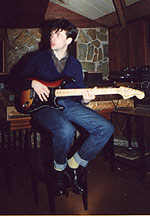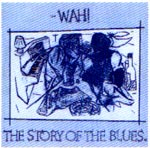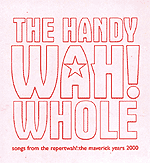Who Said Romance Was Dead? | |

| I was thinking a lot about heroes. Like, if I were now in my teens, who would my heroes be? I like to think it would be Andy Weatherall or Rupert Parkes, but who knows? It is no secret that my own heroes for that era were Kevin Rowland, Vic Godard and Paul Weller, but you could say that there were plenty of other stars in the firmament. Slightly allied to the heroic theme, I have also been thinking a lot about Pete Wylie, occasional visitor to my heroic galaxy. We had a troubled relationship down the years, but I have been having very fond thoughts about the man lately. This has, in part, been prompted by the Handy Wah! Whole double CD recently released, and by the re-reading of Julian Cope's Head On memoirs where Wylie plays a significant role in the development of the Liverpool punk scene. I guess I like to think of Wylie as a cartoon figure. He is almost a caricature of the heroic pop star/innocent abroad. Everything has always seemed so exaggerated. You picture him enthusing, shouting, laughing, roaring. You wonder about the real Pete Wylie. You ask who does he think he is? Yet, this collection shows he has a track record with some real classics sprinkled along the way: 'Better Scream', 'Seven Minutes To Midnight', 'Some Say', 'Remember', 'The Story Of The Blues', 'Hope', 'Come Back', 'Sinful'. Enough to suggest he deserves more than a footnote in pop's back pages. I would put hm alongside Billy MacKenzie of the Associates, Michael Head and Howard Devoto as one of the flawed romantic figures of the day. There are enduring images of Wylie. The first I remember is him with his Clash Police badge (I still have mine!), umbrella and copy of Jack's On The Road. Yet like Kerouac, with this very public persona of being an outgoing noble lunatic, inside there seems to be a thoughtful gifted poet. This is why I have asked Alistair to use the photo from the early '80s of the )mod) Wylie alone in the studio. Wylie's lifestyle and his obsession with his heroes (The Clash, Doors, Dexys, Bill Shankley, Jack Kerouac, Bowie, Robert De Niro and so on) - well, that's well known. I would rather focus on some of his songs. Many of his later '80s/'90s songs are unfamiliar, and I will need time to see if anything of worth and beauty is buried there, but some of those ones I mentioned earlier!! Yeah! I've put those together on one tape, and oh god, if only our national team had been boosted by the passion and punch therein. |

| 'Better Scream' was as dramatic and as smart a way to start a life in music as you can imagine. It is so great that a new generation can hear Wylie in scary Robert Mitchum Night Of The Hunter preacher mode, love and hate tattooed on the knuckles, and (conversely, given the Wah! legend) the music is sinisterly restrained, somewhere between Joy Division and The Byrds, which I have always thought a perfect place to be. It is tempting to say Wylie never matched this performance. The follow up 'Seven Minutes To Midnight' stayed just the right side of where Clash 'Tommy Gun' rage tripped over into stadium rock, and I was one of those Postcard generation who sneered at Wah! bombast, though 'Some Say' sounds great now. Fortuitously Wylie stepped back and veered from rock dreams, taking a more Dexys inspired stance which generated a string of great single starting with 'Remember' (around the time of my photo) and the immaculate 'Story Of The Blues'. Only the Jasmine Minks ever matched these afterwards. I listen now to those two songs, and then think of the Jasmines and first hearing them tear through 'Cry For A Man' in a Glasgow bedroom and feeling choked. At the live set that night I recall Jim saying it was about Thatcher, though he would later admit it was about Kinnock. Jim, if you're reading this, I don't think I ever said thank you! I am listening now to 'Heart As Big As Liverpool', the single from last year, and it's actually quite beautiful. Preposterous of course, but I love it. I guess Liverpool is central to the whole Wylie world, and context is everything. For the Liverpool of the early Wah! was one of a team dominating the world, the Shankly legend blazing, King Kenny dazzling on the pitch, the city's unique slant on punk which must have been propagated by Roger Eagle and his legendary jukebox in Erics (go back and read Head On!), the domination of Hatten and the Militant tendency, the Toxteth riots, Alan Bleasdale, Scally and so on. To some reading this, that may seem alien. It may even be an exam question: 'Pete Wylie and the spirit of Liverpool: are they inextricably linked? Discuss.' Even Wylie's contemporaries from the heyday seem remote. Michael Head may have enjoyed a few minutes as the media's favourite traditional songwriter, but others like the High Five and Send No Flowers are long gone and sadly lost. It may even seem strange to dwell on Wylie's links with the Farm (and who cares? 'Altogether Now' sounds fine at a party!), but one should not forget The Farm in their time did so much to support the Anti-Fascist movement, playing countless benefits and bruising knuckles literally in the fight against ignorance and prejudice. |

| It is no secret but music is ineluctably linked to times and places, and I cannot get away from Wah! being triumphant around the time of 'Come Back' in the charts, headlining one of those free GLC festivals in Victoria Park. This must have been the summer of 1984, and it was frightening among so many people feeling so alone as the realisation that a romance (the only one that really counted) was doomed sunk in and it did not matter that she was the most beautiful girl in town. There was Wylie up there on stage like Jim Morrison, untouchable, lost in his anthems, and I was with Vicky surrounded by Irish speedfreaks with fingers horrendously chewed, and wishing I was anywhere but there. A few weeks before we had seen the Jasmine Minks for the first time, and the song about badgers became our song, and in a few weeks we would see the Jesus And Mary Chain three nights in a row, and that would be the end. Where are you now Vicky? Listening to 'Come Back' now for the first time in 15 years, it all comes back, and I guess that is now a Wah! moment. That's my story, but one final thing for you. 'Talkin' Blues' ('Story Of The Blues part 2'), where Pete goes "People talk about revolution and class struggle without referring explicitly to everyday life, without understanding what is subversive about love and what is positive in the refusal of constraint." Where does that line come from? I knew once… © Kevin Pearce 2000 |